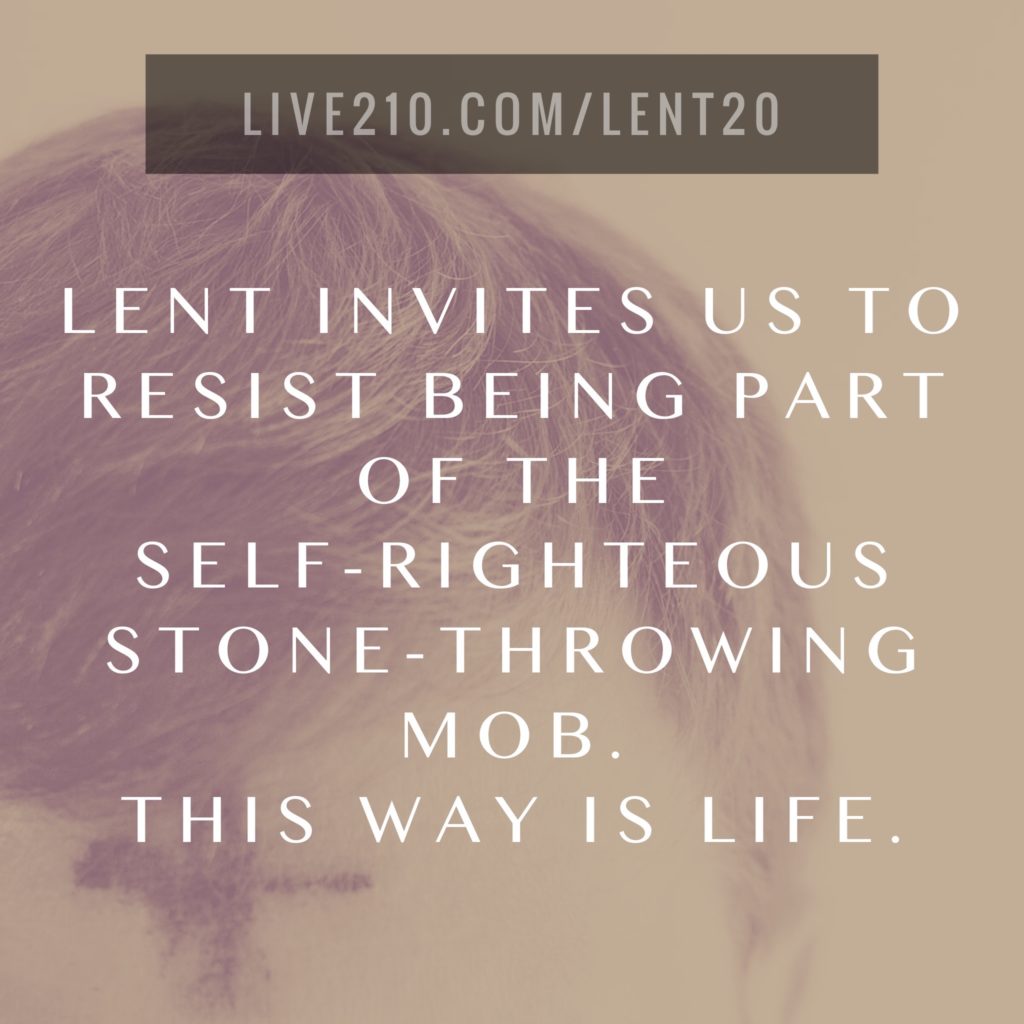5 min. to read.
Today is the 20th day of Lent. John 8:1-11 is the scripture today, the captivating scene where Jesus diffuses a mob intent on humiliating him and exploiting a woman to do so. (Historically, we’ve called this story “The Woman Taken In Adultery,” but that puts the spotlight on the wrong people.)
A group of men drags a woman before Jesus, shouting that they caught her in the act of adultery. According to the law, she must be executed—stoned to death. They demand Jesus’ verdict. He waits in silence. He kneels, and draws with his finger in the dirt. The anxious pause extends, and tension builds. Then Jesus stands and says, “Let anyone among you who is without sin cast the first stone.” Then he returns to his drawing. Slowly, starting with the oldest, the men slink away until no one is left but Jesus and the woman. He asks, “Woman, where are they? Is no one standing to condemn you? Then I don’t condemn you either. Go and leave your life of sin.”
These religious men intend to trap Jesus. If they could prove he doesn’t follow the scriptures and the traditions, perhaps they can break the hold he has on the public’s attention. Even better, he might say something blasphemous they could use to have him killed. To that end, they “catch a woman in adultery.”
How does that happen, exactly? The “act of adultery” usually takes place in private and in secret. Here we have a whole group of men who were mysteriously present at just the right time and place. Certainly, that must mean they also caught the man, but he’s notably absent. Unless he’s not. Perhaps he is one of the men accusing her. That would mean that instead of being an incredibly convenient opportunity (Look! A woman committing adultery! That’s so helpful for our whole plot to embarrass Jesus.), the entire thing was a set-up from the beginning. Someone had lied to this woman, compromised her, and then revealed her—all as a means to an end.
If they wanted a theological discussion, they could have posed this question without the woman there. She was a prop meant to heighten the stakes. If Jesus agreed with the law, this woman would be killed in public, essentially on the word of Jesus. The crowd would see him acting without compassion, against his own teachings, and might abandon him. On the other hand, if Jesus disagreed with the law and set the woman free, they could still put her to death for adultery. They only needed two witnesses for that and had more. But Jesus would have publicly outed himself as a law-breaker and heretic. Good people would stop listening to him. The crowd might even turn on him and kill him for blasphemy! Either way, he wouldn’t be able to save the woman.

Jesus’ response is of utmost genius. A pause to slow the mob’s momentum. An odd diversion to draw attention away from the terrified woman. And then a simple statement that sounds at first like agreement. “Let the one among you who is without sin cast the first stone.” Jesus didn’t enter into the debate about their intention. He forced individual reflection. “Am I one without sin? Am I willing to be part of an angry lynching mob? Will I be the one who throws the first stone?”
Lent is a season of interior reflection inviting us to let go of those things that get in the way of our encounter with Jesus. What emerges when reading this text from this light?
The men missed a constructive encounter with Jesus. What was in their way? A self-righteous need to prove that they were right. Antipathy that desired the public humiliation of their ideological enemy. Such a strong commitment to their ideology that they were willing to sacrifice another human to prove their point. And then, by acting together, they were able to each feel self-righteous without carrying the personal weight of responsibility for the lies, manipulation, and even death that might result.
Being part of a self-righteous mob (even the social media kind) is easy and validating. A group coming together to express anger or grief can be a healing experience. Still, there is always a risk that the individuals in the group will surrender their own moral compass for the rush and validation of being part of the mob. When the grievance feels self-righteous, the pressure to accept any means to justify the end is overpowering. What does it matter if one woman dies, if we can save the whole community from the influence of this heretical teacher? What does it matter if the precipitating event was fabricated or manipulated if, in the end, we can protect our community and our way of life?
When Jesus said, “Let the one among you without sin cast the first stone,” I suspect he wasn’t drawing the men’s attention to general human sinfulness. He was likely talking about this very moment. The woman had been presented as a grievous sinner worthy of death, but what of the men who had brought her and made the accusation? Were they guiltless in this? Had they lied and manipulated to bring this about? Had one of them participated in the adultery? Did they know their self-righteous display was a manipulative farce?
Jesus invited them to consider their own moral role in this debacle. Were they willing to be a party to death? Especially if they manufactured the circumstances? Jesus defused the mob by reminding the men of their personal, moral responsibility.
Lent invites us to resist being part of the self-righteous stone-throwing mob. This way is life.
